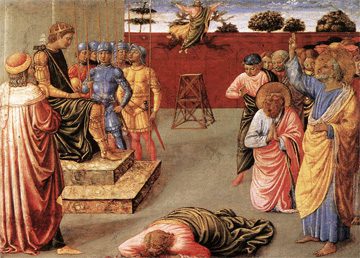A recent article in Religion News Service got me thinking about magic and Christianity. “Magicians say their craft makes them see faith as just hocus-pocus” begins by noting the recently published book by famed magician, Penn Jillette. In God, No! Signs You May Already Be an Atheist and Other Magical Tales, Jillette uses his platform as a magician to debunk religion. He says, “It’s always astonished me how any magician can be spiritual.”
In fact, an awkward relationship between Christianity and magic has existed from the beginning. We don’t know if the opponents of Jesus accused him of doing magic per se, but we know the Pharisees accused him of casting out demonss by the power of Beelzebul (Matt 12:24). Later Jewish tradition holds that Jesus was a sorcerer: “On the eve of the Passover Yeshu was hanged. For forty days before the execution took place, a herald went forth and cried, ‘He is going forth to be stoned because he has practiced sorcery and enticed Israel to apostasy. Any one who can say anything in his favor, let him come forward and plead on his behalf.’ But since nothing was brought forward in his favor he was hanged on the eve of the Passover! (Babylonian Talmud, Sanhedrin 43a). A similar charge was levied by one of the earliest pagan critics of Christianity, Celsus, who said that Jesus did his miracles by magic (Origen, Contra Celsum, 1.68).

The Acts of the Apostles presents a curious interaction between a magician/sorcerer named Simon and the followers of Jesus. Philip, one of the early apostles, went to Samaria to preach the good news (Acts 8:4ff). While he was there, many people were miraculously healed through him. This sparked the interest of Simon, who is often referred to as Simon Magus (Simon the Magician). He had amazed the people of Samaria because of his magic tricks (illusions? demonic?). The people lauded him, saying “This man is the power of God that is called Great” (Acts 8:10). But when Philip came along with genuinely miraculous healings, Simon actually believe the good news about Jesus. Apparently, he knew the difference between his magic and the actual power of God.
Shortly after Simon’s conversion, Peter and John came to Samaria to pray for the new believers, who received the Holy Spirit in a powerful way. Simon liked what he saw, and offered to pay Peter and John for the power to baptize people in the Holy Spirit. Peter’s response was clear and frightening:
“May your silver perish with you, because you thought you could obtain God’s gift with money! You have no part or share in this, for your heart is not right before God. Repent therefore of this wickedness of yours, and pray to the Lord that, if possible, the intent of your heart may be forgiven you. For I see that you are in the gall of bitterness and the chains of wickedness.” (Acts 8:20-23)
Simon, realizing that he was dealing with power far beyond anything he had known before, repented: “Pray for me to the Lord, that nothing of what you have said may happen to me” (Acts 8:24).
That’s all we know about Simon Magus from Scripture. Later Christian tradition, which may be historically accurate, identifies him as a leader of a heretical movement.
So, how does all of this relate to Jillette’s critique of religion (especially Christianity) in God, No! I can see several points of connection.
First, Jillette’s critique of Christianity is nothing new. It’s been around for almost 2,000 years. That doesn’t mean it is either true or false. It does mean that Jillette is treading a well-worn path.
Second, it is certainly true that certain manifestations of God, genuine miracles, if you will, can be faked. We’ve seen that ever since Moses appeared before Pharaoh. Some years ago, a Christian “healer” was discovered to be faking “words of knowledge” in his healing crusades. If Jillete challenges us to be wise and discerning in our estimation of God’s works, then he is doing us a service.
Third, it is interesting that Simon Magus, a classic illusionist, was so impressed by what he saw in Philip’s ministry that he converted. But, Simon’s immaturity of faith showed itself when he tried to buy the power of God. Did Simon continue to wander away from genuine faith. Tradition says he did. I wonder how Jillette would respond if he spent time among Christians who weren’t pretenders, but who were genuinely experience the presence and power of God.
Fourth, I expect Jillette’s book will draw a bunch of readers because it has a clever title and because Jillette is a fine entertainer. But, do you really want to get your religious ideas from a man whose post-high-school education was at Ringling Bros. and Barnum & Bailey Clown College? (No joke. No magic trick. That’s where he went to college. But, in fairness to clowns and their intellect/faith, see the comment by Evan below.) My guess is that Jillette’s book will be an entertaining read, but if you want to take your atheism straight up, stick with Hitchens or Dawkins.












